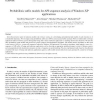Free Online Productivity Tools
i2Speak
i2Symbol
i2OCR
iTex2Img
iWeb2Print
iWeb2Shot
i2Type
iPdf2Split
iPdf2Merge
i2Bopomofo
i2Arabic
i2Style
i2Image
i2PDF
iLatex2Rtf
Sci2ools
111
click to vote
PR
2008
2008
Probabilistic suffix models for API sequence analysis of Windows XP applications
Given the pervasive nature of malicious mobile code (viruses, worms, etc.), developing statistical/structural models of code execution is of considerable importance. We investigate using probabilistic suffix trees (PSTs) and associated suffix automata (PSAs) to build models of benign application behavior with the goal of subsequently being able to detect malicious applications as anything that deviates therefrom. We describe these probabilistic suffix models and present new generic analysis and manipulation algorithms. The models and the algorithms are then used in the context of API (i.e., system call) sequences realized by Windows XP applications. The analysis algorithms, when applied to traces (i.e., sequences of API calls) of benign and malicious applications, aid in choosing an appropriate modeling strategy in terms of distance metrics and consequently provide classification measures in terms of sequence-to-model matching. We give experimental results based on classification of u...
| Added | 14 Dec 2010 |
| Updated | 14 Dec 2010 |
| Type | Journal |
| Year | 2008 |
| Where | PR |
| Authors | Geoffrey Mazeroff, Jens Gregor, Michael G. Thomason, Richard Ford |
Comments (0)

